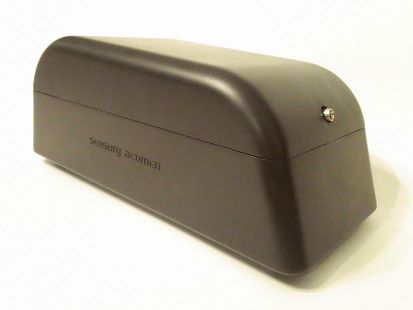Virtual Reality Health Care
Virtual realities are computer generated “worlds” that may include peripheral devices to augment the virtual experience. Software creates an environment scenario. Environments can be modeled after real life or created as an alternate reality, but the idea is to create something that the participant can relate to or recognize as a real experience. These software environments enable the user to have a sense of presence, hence being immersed.
The olfactory feedback system has three modes of operations. In the first mode, utilizing the latest technologies in interactive programming, the olfactory feedback device disperses realistic aromatic sensations in response to specific program/gaming actions or situations. In each scenario, the type of scent to be dispersed can be pre-programmed by either the clinician or software developer. In the second mode, the type of scent to be dispersed can be programmed in real-time by the clinician, in response to conversation with the patient. In the third mode, the Game Skunk® unit operates in stand-alone mode where scents are dispersed at pre-programmed intervals.
There are over 30,000 scents available, including some custom made specifically related to war.
This device supports Virtual Reality programs that treat service men and women suffering from Post Traumatic Stress Disorder (PTSD). It is not limited to PTSD; instead, it can also be used to treat those with autism, attention deficit disorder, and strokes.
Game Skunk's code is compatible with the Unity engine.
Specifications and Features
- Does not use liquids, oils, or heat and does not mix
- Delivers scent 36 inches within 3 seconds
- Scents are developed by an international fragrance and flavor developer and abide by US Government regulations
- Scents dissipate quickly
- Available in USB and wireless versions
- Power supply: 120 volt
Availability
To custom order, please contact our sales department at 925.402.1300 or
This e-mail address is being protected from spambots. You need JavaScript enabled to view it


White Papers
The Role of Olfactory Technology in Serious Gaming, Mental Training, and Therapy
Related News
President Obama signed the Veterans Health Care Budget Reform and Transparency Act Aug 7, 2014
BRAIN Initiative Challenges Researchers to Unlock Mysteries of Human Mind
Videos
The Evolutionary Paradox of Our Sense of Smell
Unlocking the Mysterious Connection Between Taste, Smell, and Memory
The Importance of Olfaction Beyond Smell
From Nose to Brain: The Neurology of Smell





